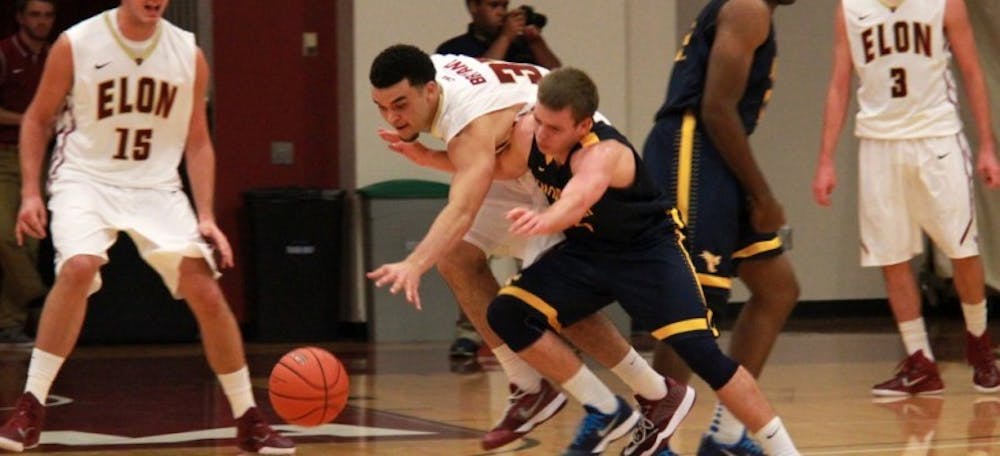When word got out that rising sophomore Elijah Bryant planned to leave Elon University, many speculated as to the reason the reigning Colonial Athletic Association Rookie of the Year chose to leave.
Earlier this week, Bryant committed to Brigham Young University over Butler University, University of Miami and University of Dayton, all of which offered him.
Questions still remained, as Bryant did not respond to requests from The Pendulum and other media outlets that covering Elon. But an interview Bryant gave to Greg Wrubell of KSL-TV-Salt Lake City surfaced in the early hours Wednesday morning:
I planned on staying at Elon for four years,” Bryant told (Wrubell) on Tuesday night, “and the only reason I left was that my academics are really important to me. It had nothing to do with the coaching staff or basketball... I’m not a shady type of guy to leave because you’re not playing me.”“I just wanted to pursue more academic interests (at BYU); I would’ve been a four-year guy (at Elon) if I left I would succeed academically. I’m not bashing Elon or anything; I just felt that in my position—not anyone else’s—in my position, (transferring to BYU) was best for me.”
Bryant says that at Elon, “I was able to play my game, but the academics weren’t there. If I am able to play my game, and have the academics, that’s all I need.”
It’s safe to surmise that this response has raised an eyebrow or two around the university, and especially the men’s basketball program. Head coach Matt Matheny has had his program consistently improving its’ Academic Progress Rate (APR) since he became the head coach, and they had multiple accolades given to them since school was let out of session for the summer:
- On May 20, eight Elon programs were recognized for multi-year APR excellence, with the men’s basketball team being one of them. The next closest CAA team, College of William & Mary, had six.
- Then, a week later, Matt Norlander of CBSSports.com reported that 16 programs had received a perfect 1,000 APR score over the four years from 2010-11 to 2013-14. Elon was one of those schools, finding itself among the likes of Dartmouth College, Stanford University, and its fellow CAA school William & Mary.
As the men’s basketball program continues to receive high honors from the NCAA, an outgoing athlete says academics are the reason for his transfer. Could Bryant’s departure, if academic-based, be about his major? On his Elon player profile, it says he was intending on majoring in biology or chemistry. But there are some logistical questions to that.
Elon has a 12:1 student-faculty ratio, compared to 18:1 at BYU. Furthermore, out of BYU’s 27,163 total undergrads, 12 percent of students major in Biology, making it tied for the most popular major at the university. There is, though, a Graduate Biology program at BYU, which could be a factor for Bryant.
The final note worth making: the APR score for BYU in the 2013-14 report was a 962, with a multiyear APR of 952. That puts them in the 30th-40th percentile among men’s basketball programs, while ranking in the 10th-20th percentile across all sports. The men’s basketball program at Elon, with the perfect score previously mentioned, rank in the 90th-100th percentile across all sports.
Some questions may have to be left unanswered. For now, Elon will go on without their leading scorer from last season, and Bryant will sit out this next season. It will be interesting to see, come the tipoff of the 2016-17 season, if Bryant is starting for the Cougars.
One thing is for certain: the West Coast Conference will have a decent-sized following from Elon in the future.


